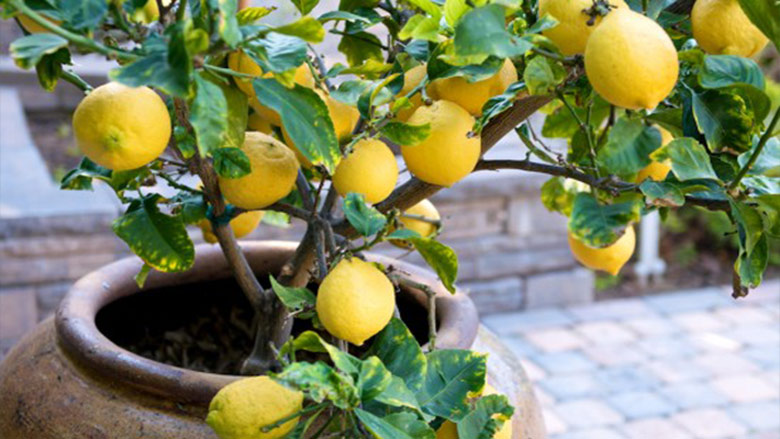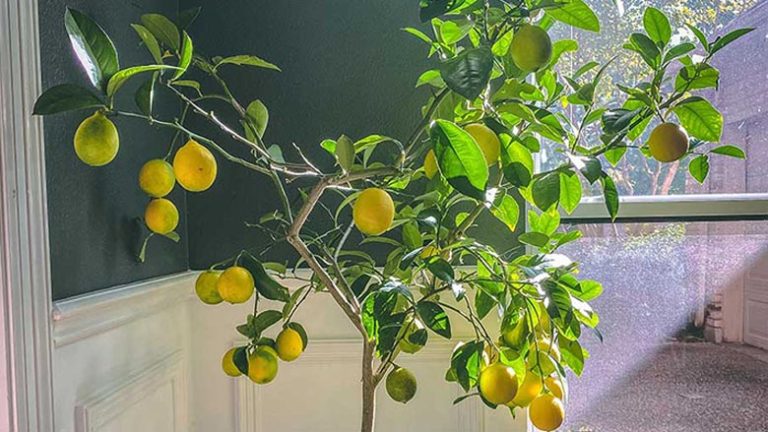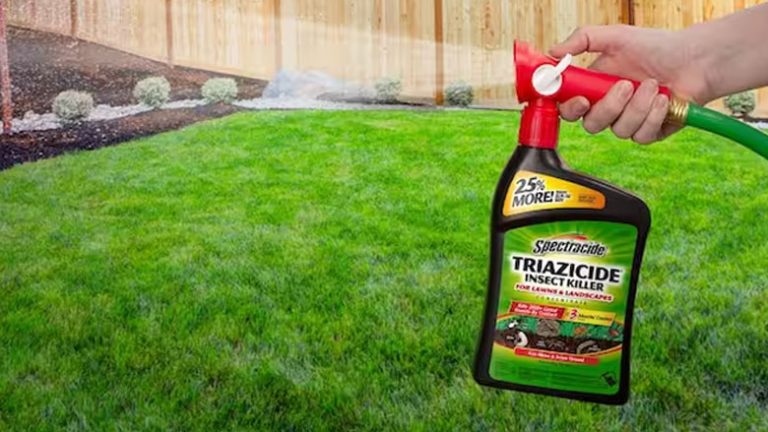Can Lemon Trees Grow in Michigan – A proper Guideline for You
Yes, lemon trees can grow in Michigan with proper care and protection from winter frost. Michigan, known for its cold and often harsh winters, may not be the first place that comes to mind when thinking about lemon tree cultivation.
However, it is possible to successfully grow lemon trees in Michigan with the right care and attention. While lemon trees are typically found in warmer climates, they can be grown in Michigan with some precautions. Planting lemon trees in containers and bringing them indoors during the colder months can help protect them from frost damage.
Alternatively, using protective coverings or creating microclimates can also extend the growing season for lemon trees in Michigan. With the right techniques and care, Michigan gardeners can enjoy their very own homegrown lemons.

Michigan’s Climate and Its Impact on Citrus Plants
Michigan’s climate plays a significant role in determining the success of growing lemon trees in the state. Understanding the specific conditions is crucial before embarking on this citrus-growing endeavor. Here are the key points to consider:
- Michigan experiences a cold climate, with winters that can be harsh and long. The state falls within USDA hardiness zones 4 and 5, which generally have temperatures that can drop as low as -30°f (-34°c).
- The frost-free growing season in Michigan is relatively short, usually ranging from late May to mid-September. This means lemon trees require careful consideration and protection during the colder months.
- Citrus plants, such as lemon trees, thrive in subtropical and tropical climates, making michigan’s climate quite challenging for their growth.
- The fluctuating temperatures, freeze-thaw cycles, and cold winter conditions can pose risks to lemon trees, potentially damaging or even killing them if not adequately protected.
Average Temperatures And Frost Dates In Michigan
To get a better understanding of the Michigan climate’s impact on lemon trees, let’s take a closer look at average temperatures and frost dates across the state:
- Michigan experiences cold winters, with average temperatures in January ranging from 14°f (-10°c) in the upper peninsula to 23°f (-5°c) in the lower peninsula.
- Springtime temperatures gradually rise, with average temperatures in April ranging from 42°f (5.5°c) in the upper peninsula to 47°f (8.3°c) in the lower peninsula.
- The frost-free period ranges from around 120 days in the northernmost regions to approximately 170 days in the southernmost parts of Michigan. However, frost or freezing temperatures may still occur during the growing season.
Factors To Consider When Growing Lemon Trees In Michigan
Despite the challenges posed by Michigan’s climate, it is still possible to grow lemon trees successfully with proper care and protection. Here are some key factors to consider:
- Selecting the right lemon tree variety: Look for cold-hardy lemon tree varieties that can tolerate freezing temperatures and shorter growing seasons. Some suitable varieties include the Meyer lemon (citrus x Meyeri) and ponderosa lemon (citrus medica x citrus maxima).
- Providing adequate shelter: Lemon trees should be planted in a protected area, such as against a south-facing wall or in a courtyard, to maximize warmth and reduce exposure to harsh winds.
- Using protective measures: During the winter months, lemon trees should be wrapped in burlap or frost blankets to shield them from freezing temperatures. Mulching around the base of the tree can also help insulate the roots.
- Indoor cultivation: Consider growing lemon trees in containers that can be moved indoors during the colder months. This allows for greater control over the environment, protecting the trees from extreme temperatures.
- Optimizing sunlight and temperature: Lemon trees require a minimum of 6-8 hours of sunlight daily to thrive. Ensure they are positioned in an area that receives ample sunlight and that temperatures are adequately regulated indoors.
- Proper watering and soil: Lemon trees prefer well-draining soil to prevent waterlogged roots. Water them deeply but less frequently, allowing the soil to dry out slightly between watering sessions.
Choosing The Right Lemon Tree Varieties For Michigan
Michigan’s cooler climate may not seem ideal for growing lemon trees, which are typically associated with warmer regions. However, with proper care and the right selection of lemon tree varieties, you can successfully grow lemons in your Michigan garden. Here are some key points to consider when choosing the right lemon tree varieties for the michigan climate.
Varieties Of Lemon Trees Suitable For Michigan’s Climate
When selecting lemon tree varieties for Michigan, it’s essential to choose those that are cold-hardy and can tolerate the state’s climate. Here are a few lemon tree varieties that are known to thrive in Michigan’s conditions:
- Improved Meyer lemon: This variety is well-suited for Michigan’s climate as it is more cold-tolerant than other lemon varieties. The improved Meyer lemon tree can withstand temperatures as low as 20°f (-6°c) and is less susceptible to frost damage.
- Ponderosa lemon: Another cold-hardy lemon tree variety suitable for Michigan is the ponderosa lemon. It can withstand temperatures as low as 18°f (-8°c) and produces large and juicy fruits, making it a popular choice for michigan gardeners.
- Citrus limon ‘eureka’: The eureka lemon tree is a cold-tolerant variety that can thrive in Michigan’s climate if provided with proper protection during freezing temperatures. It produces abundant fruit and has a tangy flavor, making it a favorite among home gardeners.
Cold-Hardy Lemon Tree Options For Michigan Gardeners
Growing lemon trees in michigan require selecting varieties that can withstand chilly winters and thrive in cooler temperatures. Here are some characteristics to look for when choosing cold-hardy lemon trees:
- Frost tolerance: Opt for lemon tree varieties that have a higher frost tolerance, as they are more likely to survive Michigan’s cold winters.
- Temperature range: Look for varieties that can tolerate a wide temperature range, including both cold winters and hot summers, ensuring they are well-suited for Michigan’s climate.
- Growth habit: Consider dwarf or semi-dwarf lemon tree varieties, as they are easier to protect from cold temperatures and can be grown in containers, allowing for flexibility in placement throughout the changing seasons.
Considerations When Selecting Lemon Tree Varieties For Michigan
When selecting lemon tree varieties for your Michigan garden, there are a few additional factors to keep in mind:
- Microclimate: Consider the microclimate of your garden, as certain areas may be slightly warmer than others, providing more favorable conditions for lemon tree growth.
- Pollination requirements: Some lemon tree varieties may require cross-pollination or the presence of another citrus tree nearby to produce fruits. Ensure you choose varieties that are self-pollinating or have compatible pollinators available.
- Soil and sunlight: Lemon trees thrive in well-draining soil with full sun exposure. Choose varieties that are adaptable to various soil types and can tolerate both direct sunlight and partial shade.
Tips For Successfully Growing Lemon Trees In Michigan
Lemon trees are typically associated with warm and sunny climates, but with the right care and attention, it is possible to grow them in michigan. If you’re eager to add a touch of citrus to your garden, here are some helpful tips to ensure your lemon trees thrive in the unpredictable michigan weather.
Best Practices For Planting Lemon Trees In Michigan
- Choose the right lemon tree variety: Opt for cold-hardy lemon trees varieties, such as meyer lemons, ponderosa lemons, and improved meyer lemons, that are more tolerant of colder temperatures.
- Select a suitable location: Lemon trees require ample sunlight, so find a spot in your garden that receives at least six to eight hours of direct sunlight each day.
- Prepare the soil: Ensure the soil is well-draining and loamy, with a slightly acidic ph level of around 6.0 to 6.5. If your soil is heavy clay, consider incorporating organic matter or using raised beds to improve drainage.
- Planting technique: Dig a hole that is twice as wide and deep as the lemon tree’s root ball. Carefully place the tree in the hole and backfill with soil, gently firming it around the base. Avoid planting the tree too deeply, as this can lead to rot.
Providing The Ideal Growing Conditions For Lemon Trees In Michigan
- Watering: Lemon trees require regular watering, especially during the hotter months. Water deeply, ensuring the soil is moist but not waterlogged. Avoid overwatering, as this can cause root rot.
- Fertilization: Apply a balanced, slow-release citrus fertilizer in early spring and again in late summer to provide essential nutrients for healthy growth. Follow the instructions on the package for the correct dosage.
- Pruning: Prune your lemon trees annually to remove dead or damaged wood and maintain an open canopy for better air circulation and light penetration. Pruning also encourages new growth.
- Pest control: Monitor your lemon trees for common pests such as aphids, scale insects, and mites. Treat infestations promptly using organic or chemical solutions to prevent damage to the leaves and fruits.
- Mulching: Apply a layer of organic mulch around the base of the lemon tree to conserve moisture, suppress weeds, and regulate soil temperature. Keep the mulch a few inches away from the trunk to prevent rot.
Protecting Lemon Trees During Winter In Michigan
- Cold protection: As winter approaches, cover your lemon trees with frost blankets or burlap to protect them from freezing temperatures. In severe cold snaps, consider using heat lamps or christmas lights to provide additional warmth.
- Container cultivation: If you’re concerned about extreme winter temperatures, grow your lemon tree in a container that can be moved indoors during the colder months. Place it near a sunny window or under grow lights.
- Proper insulation: Wrap the trunk of your lemon tree with an insulating material, such as foam or blanket, to shield it from frost and freezing winds. This helps prevent damage to the bark and delicate branches.
- Reduce watering: During the winter months, reduce the frequency of watering, allowing the soil to dry out slightly between waterings. Avoid fertilizing during this time as well, as it can stimulate new growth that may be susceptible to winter damage.
Providing Optimal Sunlight And Soil Conditions
The Importance Of Sunlight For Lemon Tree Growth In Michigan
Michigan’s colder climate may pose some challenges for growing lemon trees, but with proper care and attention, they can thrive in this region. One crucial factor for their success is providing optimal sunlight. Here are a few key points to consider:
- Lemon trees require full sun exposure, meaning they need at least six hours of direct sunlight each day. This allows them to photosynthesize efficiently and produce energy for growth.
- In Michigan, where the climate can be unpredictable, it’s essential to choose a location that receives maximum sunlight throughout the day. Consider planting your lemon tree in an area with southern exposure or where it won’t be shaded by other structures or trees.
- Optimizing sunlight exposure may involve strategic placement of the tree or using techniques like reflective surfaces to redirect sunlight onto the tree during shorter daylight hours.
Recommendations For Soil pH and Fertility For Lemon Trees In Michigan
Besides sunlight, the pH level and fertility of the soil significantly impact lemon tree growth. Michigan’s soil tends to be slightly acidic, so paying attention to the soil’s pH and fertility is crucial. Here are some essential recommendations:
- Lemon trees prefer slightly acidic to neutral soil, with a pH level between 5.5 and 7.0. It’s crucial to test the soil’s pH level before planting and adjust it if necessary using organic amendments or lime.
- Additionally, maintaining proper soil fertility is essential for lemon tree health. Consider conducting a soil test to assess the nutrient levels and make necessary adjustments by adding organic matter, such as compost or well-rotted manure.
- Regularly monitor the soil’s fertility, especially for essential nutrients like nitrogen, phosphorus, and potassium. Balanced fertilizers specifically formulated for citrus trees can provide the necessary nutrients throughout the growing season.
- Applying a layer of organic mulch around the base of the lemon tree helps retain moisture and provides a slow release of nutrients as it decomposes. However, avoid piling the mulch too close to the trunk to prevent rotting.
Preparing The Soil And Providing Proper Drainage For Lemon Trees In Michigan
Proper soil preparation and drainage are vital for the success of your lemon tree in michigan’s climate. Consider the following key points:
- Before planting your lemon tree, prepare the soil by removing any weeds, rocks, or debris. Loosen the soil to a depth of about 12-18 inches to ensure good root penetration and drainage.
- Ensure that the planting hole is dug wider than the root ball to encourage root expansion.
- Michigan’s clayey soil tends to retain water, which can be problematic for lemon trees. To improve drainage, consider amending the soil with organic matter like compost or peat moss.
- Adequate drainage is essential for preventing root rot and other water-related issues. If the soil tends to hold water, raising the planting area and incorporating raised beds or mounds can help improve drainage.
- Regularly monitor the soil moisture levels, ensuring that the soil remains damp but not waterlogged. Overwatering should be avoided, as it can lead to root suffocation and diseases.
Watering And Fertilizing Lemon Trees In Michigan
Lemon trees require regular and adequate watering to thrive in the michigan climate. Here are some key points to keep in mind when watering your lemon trees:
- Water deeply: Lemon trees have deep root systems, so it’s important to water them deeply rather than giving frequent shallow waterings. This encourages deep root growth and helps the tree withstand drought conditions.
- Water consistently: Consistency is key when it comes to watering lemon trees. Aim for a regular watering schedule, ensuring the soil is consistently moist but not waterlogged. In michigan, lemon trees typically need watering once or twice a week, depending on weather conditions.
- Monitor moisture levels: Keep an eye on the moisture level of the soil. Before watering, check the top few inches of soil. If it feels dry, it’s time to water. However, avoid overwatering, as it can lead to root rot or other diseases.
- Mulch to retain moisture: Apply a layer of organic mulch around the base of the lemon tree to help retain moisture in the soil. Mulch also acts as a barrier against weeds and regulates soil temperature.
Essential Nutrients And Fertilization Schedules For Lemon Trees In Michigan
To ensure the healthy growth and productivity of lemon trees in michigan, providing them with essential nutrients through fertilization is crucial. Consider the following points when fertilizing your lemon trees:
- Nitrogen-rich fertilizers: Lemon trees require a steady supply of nitrogen for leaf and overall plant growth. Using a nitrogen-rich fertilizer can help meet this requirement. Apply the fertilizer according to the manufacturer’s instructions, typically in early spring and early summer.
- Balanced fertilizers: In addition to nitrogen, lemon trees also need other essential nutrients such as phosphorus, potassium, and micronutrients. Look for a balanced fertilizer specifically formulated for citrus trees to provide these necessary nutrients.
- Slow-release fertilizers: Using slow-release fertilizers is a convenient way to ensure a continuous supply of nutrients over an extended period. These fertilizers release nutrients gradually, reducing the risk of over-fertilization and promoting steady growth.
- Soil testing: Conducting periodic soil tests can help determine the specific nutrient needs of your lemon trees. This information can guide you in selecting the right fertilizer and adjusting the application rates accordingly.
Avoiding Common Mistakes In Watering And Fertilizing Lemon Trees In Michigan
While watering and fertilizing lemon trees in Michigan, it’s important to avoid common mistakes that can hinder their health. Consider the following to prevent any potential issues:
- Overwatering: Lemon trees are susceptible to root rot if overwatered. Monitor soil moisture levels and avoid excessive watering. Ensure proper drainage to prevent waterlogging.
- Underwatering: On the other hand, underwatering can cause stress and lead to decreased fruit production. Keep a consistent watering schedule, especially during hot and dry periods.
- Improper fertilization: Applying too much fertilizer or using the wrong type can harm your lemon trees. Follow the recommended dosage and choose a fertilizer specifically formulated for citrus trees.
- Fertilizing at the wrong time: Timing is crucial when it comes to fertilizing lemon trees. Avoid fertilizing during periods of dormancy or extreme temperatures. Follow the recommended fertilization schedule for the best results.
Pruning And Pest Control For Lemon Trees In Michigan
Pruning lemon trees is essential for maintaining their health and productivity. Proper pruning techniques can help lemon trees in Michigan thrive and produce an abundance of delicious fruit. Here are some key points to keep in mind when pruning lemon trees:
- Timing: It is best to prune lemon trees in the late winter or early spring before new growth starts. This allows the tree to recover quickly and promotes healthy regrowth.
- Tools: Use sharp and clean pruning shears or loppers to make clean cuts. Avoid using dull or dirty tools as they can damage the branches and introduce diseases.
- Remove dead and diseased branches: Start by removing any dead or diseased branches. Cut them back to healthy wood to prevent the spread of infection and improve airflow within the tree.
- Thin-out crowded branches: Lemon trees can develop dense growth, which hinders airflow and sunlight penetration. Thin out crowded branches to improve air circulation and light exposure throughout the tree.
- Shape the tree: Prune to shape the lemon tree by removing branches that cross or rub against each other. Aim for an open, balanced canopy that allows sunlight to reach all parts of the tree.
- Encourage fruit production: To promote fruit production, selectively prune branches that are growing upright or excessively long. This redirects energy to the lower branches where the fruit will form.
Identifying And Managing Common Pests And Diseases In Lemon Trees In Michigan
While lemon trees in Michigan generally thrive, they are susceptible to certain pests and diseases. Being able to identify and manage these issues is crucial for maintaining the health of your lemon trees. Here are some key points to consider:
Citrus leafminer: This pest lays eggs on young leaves, causing silvery tracks and distorted growth. Use insecticidal soap or oil to control leafminer infestations.
Aphids: Aphids are small, sap-sucking insects that can cause curling of leaves and stunted growth. Use water spray or insecticidal soap to control aphid populations.
Scale insects: Scales appear as small, brown bumps on branches and leaves. They feed on the sap and can weaken the tree. Prune and remove heavily infested branches or use horticultural oil to manage scale insects.
Citrus canker: This bacterial disease causes raised, corky lesions on leaves, fruits, and stems. It can be challenging to control. Prune and destroy infected plant parts, and copper-based sprays can help manage citrus canker.
Citrus scab: Citrus scab causes raised, scaly lesions on fruit, leaves, and twigs. Prune and destroy infected parts and apply copper-based sprays to manage citrus scab.
Root rot: Root rot is caused by fungi and can lead to root damage and the decline of the tree. Ensure proper drainage and avoid overwatering to prevent root rot.
Organic Pest Control Methods For Lemon Trees In Michigan
If you prefer organic methods to control pests on your lemon trees, there are several options available. Here are some organic pest control methods for lemon trees in Michigan:
- Ladybugs and lacewings: These beneficial insects feed on aphids and other pests, helping keep their populations in check. Introduce them to your garden to naturally control aphids.
- Neem oil: Neem oil is derived from the neem tree and acts as a natural insecticide. It can help control various pests, including aphids, scales, and leafminers.
- Diatomaceous earth: Sprinkling food-grade diatomaceous earth around the base of your lemon tree can deter crawling insects like ants and snails.
- Companion planting: Planting pest-repellent herbs and flowers like basil, marigold, and lavender around your lemon tree can discourage pests and attract beneficial insects.
- Organic sprays: Homemade sprays using ingredients like garlic, hot pepper, or soap can be effective against some pests. Spray them directly on affected parts of the tree as needed.
Frequently Asked Questions For Can Lemon Trees Grow In Michigan
Can Lemon Trees Survive In The Cold Climate Of Michigan?
Lemon trees are not well-suited for the cold climate of michigan as they require warm temperatures and can’t tolerate freezing temperatures. They thrive in tropical and subtropical climates with temperatures above 50 degrees Fahrenheit.
What Are The Challenges Of Growing Lemon Trees In Michigan?
Growing lemon trees in michigan can be challenging due to the cold climate and shorter growing season. They may require extra care such as protection from frost, providing proper insulation, and growing in containers that can be moved indoors during winter.
Can Lemon Trees Be Grown In Michigan With The Help Of Greenhouse Or Indoor Cultivation?
Yes, lemon trees can be successfully grown in michigan with the help of a greenhouse or indoor cultivation. These controlled environments can provide the necessary warmth and protection from freezing temperatures, allowing lemon trees to thrive and produce fruit even in colder regions.
What type of lemon tree is best suited for Michigan’s climate?
For Michigan’s climate, it’s best to choose cold-hardy lemon tree varieties, such as the Meyer lemon tree or the Ponderosa lemon tree. These varieties can better withstand cooler temperatures.
Can I grow lemon trees from seeds in Michigan?
Yes, you can grow lemon trees from seeds, but be aware that it may take several years for the tree to produce fruit. Consider starting with a grafted lemon tree for faster fruiting and better overall performance.
Conclusion
After considering all the factors, it is clear that growing lemon trees in michigan is possible, but it requires extra effort and attention. The climate in michigan is not ideal for lemon trees due to its cold winters and shorter growing seasons.
However, by utilizing techniques such as growing lemon trees in containers, providing insulation and protection during the winter months, and creating a microclimate, it is possible to successfully grow lemon trees in michigan. By selecting cold-hardy varieties and providing proper care, lemon trees can thrive and produce fruit in this region as well.
It is important to note that growing lemon trees in michigan may require more time, effort, and resources compared to regions with a more suitable climate. Nonetheless, the joy of harvesting and enjoying homegrown lemons in michigan makes the effort worthwhile.
So, if you are passionate about growing lemon trees and up for the challenge, go ahead and give it a try!
![[Explained] Can You Grow Artichokes in Michigan](https://gardensuggest.com/wp-content/uploads/2023/08/Can-You-Grow-Artichokes-in-Michigan-1-768x394.jpg)
![Why Are My Basil Leaves Curling [Causes and Solutions]](https://gardensuggest.com/wp-content/uploads/2023/09/Why-Are-My-Basil-Leaves-Curling-768x432.webp)



![[Answered] Can You Bury Cucumber Stems?](https://gardensuggest.com/wp-content/uploads/2023/07/can-you-bury-cucumber-stems-768x576.jpg)